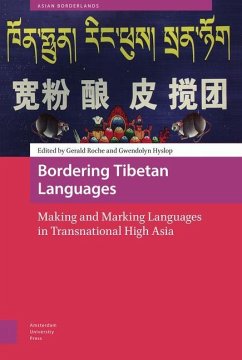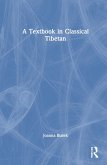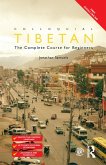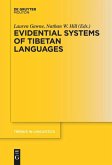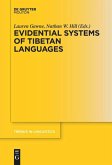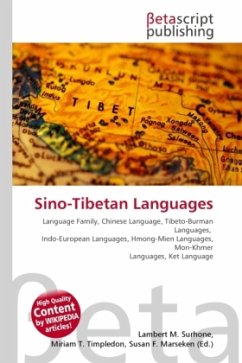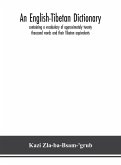Gerald Roche, Gwendolyn Hyslop, Willem Van Schendel, Tina Harris, Cathryn DonohueMaking and Marking Languages in Transnational High Asia
Bordering Tibetan Languages
Making and Marking Languages in Transnational High Asia
Herausgeber: Roche, Gerald; Hyslop, Gwendolyn
Gerald Roche, Gwendolyn Hyslop, Willem Van Schendel, Tina Harris, Cathryn DonohueMaking and Marking Languages in Transnational High Asia
Bordering Tibetan Languages
Making and Marking Languages in Transnational High Asia
Herausgeber: Roche, Gerald; Hyslop, Gwendolyn
- Gebundenes Buch
- Merkliste
- Auf die Merkliste
- Bewerten Bewerten
- Teilen
- Produkt teilen
- Produkterinnerung
- Produkterinnerung
This book examines the complex interactions between state, ethnic, and linguistic borders in the Himalayas. These case studies from Bhutan, China, India, and Nepal show how people in the Himalayas talk borders into existence, and also how those borders speak to them and their identities.
Andere Kunden interessierten sich auch für
![A Textbook in Classical Tibetan A Textbook in Classical Tibetan]() Joanna BialekA Textbook in Classical Tibetan168,99 €
Joanna BialekA Textbook in Classical Tibetan168,99 €![Colloquial Tibetan Colloquial Tibetan]() Jonathan SamuelsColloquial Tibetan168,99 €
Jonathan SamuelsColloquial Tibetan168,99 €![Tibetan-English Dictionary Tibetan-English Dictionary]() H. A. JaschkeTibetan-English Dictionary69,99 €
H. A. JaschkeTibetan-English Dictionary69,99 €![Evidential Systems of Tibetan Languages Evidential Systems of Tibetan Languages]() Evidential Systems of Tibetan Languages30,99 €
Evidential Systems of Tibetan Languages30,99 €![Evidential Systems of Tibetan Languages Evidential Systems of Tibetan Languages]() Evidential Systems of Tibetan Languages102,99 €
Evidential Systems of Tibetan Languages102,99 €![Sino-Tibetan Languages Sino-Tibetan Languages]() Sino-Tibetan Languages23,99 €
Sino-Tibetan Languages23,99 €![An English-Tibetan dictionary, containing a vocabulary of approximately twenty thousand words and their Tibetan equivalents An English-Tibetan dictionary, containing a vocabulary of approximately twenty thousand words and their Tibetan equivalents]() Kazi Zla-Ba-Bsam-'GrubAn English-Tibetan dictionary, containing a vocabulary of approximately twenty thousand words and their Tibetan equivalents72,99 €
Kazi Zla-Ba-Bsam-'GrubAn English-Tibetan dictionary, containing a vocabulary of approximately twenty thousand words and their Tibetan equivalents72,99 €-
-
-
This book examines the complex interactions between state, ethnic, and linguistic borders in the Himalayas. These case studies from Bhutan, China, India, and Nepal show how people in the Himalayas talk borders into existence, and also how those borders speak to them and their identities.
Produktdetails
- Produktdetails
- Verlag: Routledge
- Seitenzahl: 218
- Erscheinungstermin: 1. August 2022
- Englisch
- Abmessung: 240mm x 161mm x 16mm
- Gewicht: 496g
- ISBN-13: 9789463725040
- ISBN-10: 9463725040
- Artikelnr.: 64138093
- Herstellerkennzeichnung
- Libri GmbH
- Europaallee 1
- 36244 Bad Hersfeld
- gpsr@libri.de
- Verlag: Routledge
- Seitenzahl: 218
- Erscheinungstermin: 1. August 2022
- Englisch
- Abmessung: 240mm x 161mm x 16mm
- Gewicht: 496g
- ISBN-13: 9789463725040
- ISBN-10: 9463725040
- Artikelnr.: 64138093
- Herstellerkennzeichnung
- Libri GmbH
- Europaallee 1
- 36244 Bad Hersfeld
- gpsr@libri.de
Gerald Roche is a Senior Research Fellow in the Department of Politics, Media, and Philosophy at La Trobe University (Australia). He is an international expert in language revitalization and the politics of language in Tibet and the Himalayas. Gwendolyn Hyslop received her PhD from the University of Oregon and is a Senior Lecturer in the Department of Linguistics at the University of Sydney. She is a specialist of Tibeto Burman languages, in particular those from Bhutan. She has written a grammar of Kurtöp and also specializes in Historical Linguistics. Willem van Schendel, Professor of History, University of Amsterdam and International Institute of Social History, the Netherlands. He works with the history, anthropology and sociology of Asia. Recent works include A History of Bangladesh (2020), Embedding Agricultural Commodities (2017, ed.), The Camera as Witness (2015, with J. L. K. Pachuau). See uva.academia.edu/WillemVanSchendel. Cathryn Donohue (PhD, Stanford University) is a field linguist specializing in Sino-Tibetan, with a primary focus on Himalayan languages. Her linguistic interests center on morphosyntax, tonal phenomena, and language variation, including documentary and outreach components. She is currently a Research Assistant Professor at the Hong Kong Polytechnic University. Charisma K. Lepcha teaches anthropology at Sikkim University, India. Her research interests include religion, identity, indigeneity, and linguistic anthropology in the eastern Himalaya borderlands. She was a Fellow at the Indian Institute of Advanced Study (IIAS), Shimla (2018-2019). She was also a Visiting Scholar at the Harvard-Yenching Institute, Cambridge, MA (2021-2022). Dirk Schmidt graduated with an MA in Tibetan Studies in 2008. He then went to India to learn Tibetan. He has worked with Esukhia since 2011 on a variety of research and development projects related to Tibetan language education, children's literature, and translation technology. Dirk is currently a PhD student at the University of Wisconsin-Madison. Hiroyuki Suzuki holds a D.Litt. in linguistics from Kyoto University (2007) and is currently a part-time lecturer teaching the Chinese language at Kyoto University, Japan. His principal research interests are descriptive linguistics, geolinguistics, dialectology, and sociolinguistics of languages in the Tibetosphere. Shannon M. Ward is an Assistant Professor of Linguistic Anthropology at the University of British Columbia Okanagan, Canada. Her research examines language socialization, multilingualism, and heritage language learning, with a focus on communities from the Himalayas.
Acknowledgements
About the Cover Image
1 Introduction: Bordering Tibetan Languages: Making and Marking Languages in Transnational High Asia
by Gerald Roche
2 Playing with Language Boundaries: Heteroglot Standard Language Ideology and Linguistic Belonging among Amdo Children
by Shannon Ward
3 The Role of Classical Tibetan (Choke) on the Development of Kurtop
a Language of Bhutan
by Gwendolyn Hyslop
4 Reimagining Rongring without Tibetan Buddhist Influence
by Charisma K. Lepcha
5 Glottonyms
Identity
and Language Recognition in the Eastern Tibetosphere
by Hiroyuki Suzuki
6 On the Yak Horns of a Dilemma: Diverging Standards in Diaspora Tibetan
by Dirk Schmidt
7 Changing Identity and Linguistic Practices in Nubri: Veiled Language Endangerment in the Nepalese Tibetosphere
by Cathryn Donohue
8 Borderline Dominance: Transnational Tibetan Language Politics in the Himalayas
by Gerald Roche
9 Borders: In Conclusion
by Gwendolyn Hyslop
Tibetan Language Summaries
Index
About the Cover Image
1 Introduction: Bordering Tibetan Languages: Making and Marking Languages in Transnational High Asia
by Gerald Roche
2 Playing with Language Boundaries: Heteroglot Standard Language Ideology and Linguistic Belonging among Amdo Children
by Shannon Ward
3 The Role of Classical Tibetan (Choke) on the Development of Kurtop
a Language of Bhutan
by Gwendolyn Hyslop
4 Reimagining Rongring without Tibetan Buddhist Influence
by Charisma K. Lepcha
5 Glottonyms
Identity
and Language Recognition in the Eastern Tibetosphere
by Hiroyuki Suzuki
6 On the Yak Horns of a Dilemma: Diverging Standards in Diaspora Tibetan
by Dirk Schmidt
7 Changing Identity and Linguistic Practices in Nubri: Veiled Language Endangerment in the Nepalese Tibetosphere
by Cathryn Donohue
8 Borderline Dominance: Transnational Tibetan Language Politics in the Himalayas
by Gerald Roche
9 Borders: In Conclusion
by Gwendolyn Hyslop
Tibetan Language Summaries
Index
Acknowledgements
About the Cover Image
1 Introduction: Bordering Tibetan Languages: Making and Marking Languages in Transnational High Asia
by Gerald Roche
2 Playing with Language Boundaries: Heteroglot Standard Language Ideology and Linguistic Belonging among Amdo Children
by Shannon Ward
3 The Role of Classical Tibetan (Choke) on the Development of Kurtop
a Language of Bhutan
by Gwendolyn Hyslop
4 Reimagining Rongring without Tibetan Buddhist Influence
by Charisma K. Lepcha
5 Glottonyms
Identity
and Language Recognition in the Eastern Tibetosphere
by Hiroyuki Suzuki
6 On the Yak Horns of a Dilemma: Diverging Standards in Diaspora Tibetan
by Dirk Schmidt
7 Changing Identity and Linguistic Practices in Nubri: Veiled Language Endangerment in the Nepalese Tibetosphere
by Cathryn Donohue
8 Borderline Dominance: Transnational Tibetan Language Politics in the Himalayas
by Gerald Roche
9 Borders: In Conclusion
by Gwendolyn Hyslop
Tibetan Language Summaries
Index
About the Cover Image
1 Introduction: Bordering Tibetan Languages: Making and Marking Languages in Transnational High Asia
by Gerald Roche
2 Playing with Language Boundaries: Heteroglot Standard Language Ideology and Linguistic Belonging among Amdo Children
by Shannon Ward
3 The Role of Classical Tibetan (Choke) on the Development of Kurtop
a Language of Bhutan
by Gwendolyn Hyslop
4 Reimagining Rongring without Tibetan Buddhist Influence
by Charisma K. Lepcha
5 Glottonyms
Identity
and Language Recognition in the Eastern Tibetosphere
by Hiroyuki Suzuki
6 On the Yak Horns of a Dilemma: Diverging Standards in Diaspora Tibetan
by Dirk Schmidt
7 Changing Identity and Linguistic Practices in Nubri: Veiled Language Endangerment in the Nepalese Tibetosphere
by Cathryn Donohue
8 Borderline Dominance: Transnational Tibetan Language Politics in the Himalayas
by Gerald Roche
9 Borders: In Conclusion
by Gwendolyn Hyslop
Tibetan Language Summaries
Index

